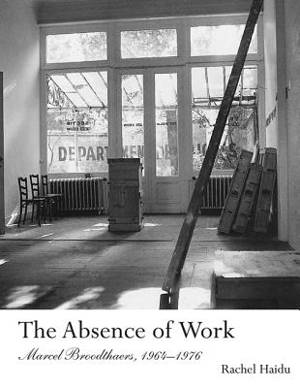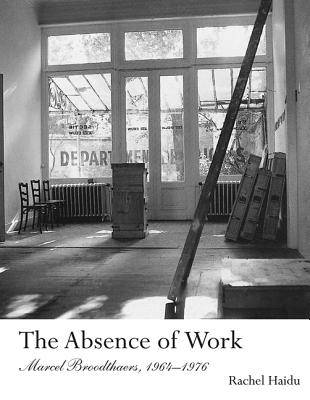
- Afhalen na 1 uur in een winkel met voorraad
- Gratis thuislevering in België vanaf € 30
- Ruim aanbod met 7 miljoen producten
- Afhalen na 1 uur in een winkel met voorraad
- Gratis thuislevering in België vanaf € 30
- Ruim aanbod met 7 miljoen producten
Omschrijving
A provocative investigation of Marcel Broodthaers's work as a reflection on the uses and abuses of language.
In 1964, at age forty, Marcel Broodthaers (1924-1976) proclaimed that his years of writing poetry--of being "good for nothing," in his words--were over, and a brief but dazzling artistic career began. Considered a founding father of institutional critique, Broodthaers created hundreds of objects, books, films, photographs and exhibitions, including a "fictive" museum of modern art that evolved from an installation in his own home to a massive exhibition of over three hundred works representing eagles. In The Absence of Work, Rachel Haidu argues that all of Broodthaers's art is defined by its relationship to language. His perception of his poetry's "failure to communicate" led him to explore in his art the noncommunicative, nontransparent uses of words.
Haidu's characterization of Broodthaers's contribution to institutional critique represents a major departure from the usual approach to this movement. With The Absence of Work, one of the first monographs on Broodthaers in English, Haidu demystifies a crucial and enigmatic figure in postwar and contemporary art.
Specificaties
Betrokkenen
- Auteur(s):
- Uitgeverij:
Inhoud
- Aantal bladzijden:
- 357
- Taal:
- Engels
- Reeks:
Eigenschappen
- Productcode (EAN):
- 9780262525091
- Verschijningsdatum:
- 20/09/2013
- Uitvoering:
- Paperback
- Formaat:
- Trade paperback (VS)
- Afmetingen:
- 178 mm x 226 mm
- Gewicht:
- 857 g

Alleen bij Standaard Boekhandel
Beoordelingen
We publiceren alleen reviews die voldoen aan de voorwaarden voor reviews. Bekijk onze voorwaarden voor reviews.











